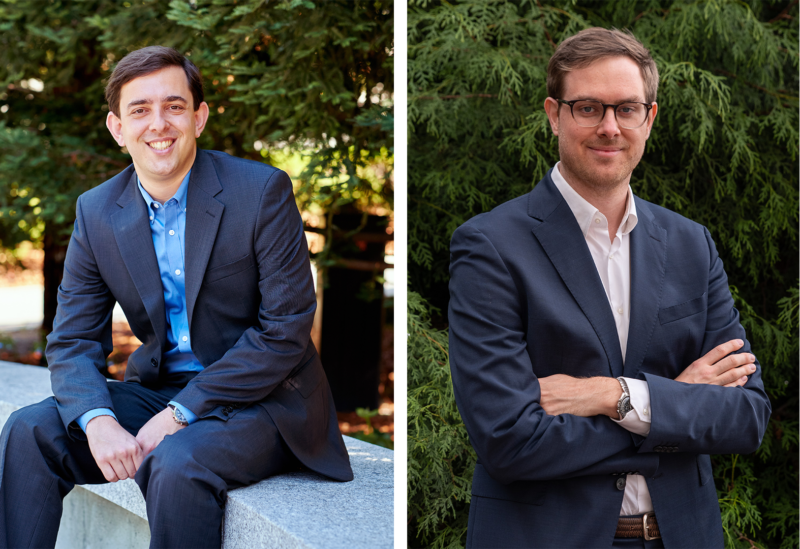Why do people choose to go to college (or not)? What impact do race-based or financial aid policies have on higher education and the broader economy? In this episode of the Matrix Podcast, Julia Sizek spoke with two UC Berkeley-trained economists whose research focuses on the economic impacts of higher education.
Maximilian Müller completed his PhD in Economics at UC Berkeley this year and is now starting a position as Postdoctoral Fellow at the briq Institute on Behavior and Inequality in Bonn. In Fall 2023, he will join the Toulouse School of Economics as an Assistant Professor. Maximilian is a behavioral economist studying questions in fields such as education, development, and family economics. In his research, he examines social influences on individual behavior around big life decisions, such as career choices, and their potential consequences for society-wide outcomes, such as social mobility. Prior to his PhD, he obtained an M.Phil. in Economics from the University of Oxford and a B.Sc. in Economics from the Ludwig-Maximilians-Universität in Munich.
Zach Bleemer is an Assistant Professor of Economics at the Yale School of Management and a research associate at UC Berkeley’s Center for Studies in Higher Education. His current research uses natural experiments to examine the net efficiency and equity ramifications of educational meritocracy, with recent studies on race-based affirmative action, race-neutral alternatives to affirmative action, and university policies that restrict access to high-demand college majors. Zach holds a BA in philosophy, economics, and mathematics from Amherst College and a PhD in economics from UC Berkeley.
Listen to the podcast below or on Google Podcasts or Apple Podcasts. Excerpts from the interview are included below.
Q: As economists, how do you measure the benefits of higher education, particularly as economists?
Maximilian Müller: We start with what would be the counterfactual — if a person had not gone to college — and we compare that to how they did when they did go to college. We compare these two scenarios. As economists, we often focus on earnings, of course, but we also think about benefits in terms of health behavior, life satisfaction, and then some spillover benefits to broader society, such as democratic participation, or jobs you create — benefits that don’t just accrue to you, but to broader society. That’s how we think about it. But measurement is tricky, because we do not observe a person going to college and not going to college. That’s what makes it hard. And we cannot just compare people who have gone to college with people who haven’t gone to college, because they might be different in several aspects. So this makes it tricky. But thanks to researchers like Zach, we’ve come up with ways to make this counterfactual comparison possible, and compare the benefits of higher education.
Zach Bleemer: That’s right, there are personal economic returns of a college education that can be measured in terms of an individual’s wages, and then also public economic returns, things like innovation and entrepreneurship that don’t just benefit the person who generates them, but benefit people in communities at large. We try to measure the degree to which a college education shapes people’s decisions in a way that either leads them to higher wages themselves, or to generate these public economic returns. For example, I do a lot of work with tax records. You can look at individuals once they start filing taxes in their late teens or early 20s, and then follow them until years later. You can see in tax records people’s earnings, as well as information like business formation and entrepreneurship, which also have tax ramifications. And you can link individuals to patent records to get a measure of innovation.
The trick here is to try to figure out what these people would have done in their lives if they hadn’t gone to college. To give a couple of examples of ways to study this, you can look at changes in university admissions policies that pull a group of students who may not have otherwise gone to college at all, or who may have otherwise gone to a less selective set of universities, and ask what happens to these kids when the admissions policies change, providing them with access to this new higher education resource. You can look at policies inside of universities that change students’ likelihood of degree attainment, particularly kids on the margins who wouldn’t have earned a college degree if not for the change. We can try to leverage these natural experiments to learn the impact of college on these students’ lives.
Q: Zach, you conducted research on how changing admission policies at the University of California changed the student body and who could benefit from college. What was your study about?
Bleemer: As you may know, California public universities do not use race-based affirmative action in admissions, and they haven’t since 1998, when a ballot proposition (Proposition 209) prohibited the use of race-based affirmative action in the state. Before 1998, Black and Hispanic applicants to any University of California campus were provided with large admissions advantages. They were able to enroll at universities that they would have otherwise not had access to, absent this race-based affirmative action policy. Then after 1998, these admissions advantages disappeared, and we saw this cascade of Black and Hispanic students into less selective universities, and in some cases, out of university enrollment altogether.
So what’s the ramification of going to college? Well, one way of understanding that is to link all of these University of California applicants in the years prior to and after this policy change to a variety of outcomes, including where they went to college, what they studied in college, and how they did in college (in terms of their grades and whether they graduated), and then following these students into the labor market. You can measure how the kinds of colleges these students went to changed their earnings and their place in the California economy.
The striking thing that comes out of this study is that after 1998, Black and Hispanic young Californians lost a lot of economic power — which is to say, on average, Black and Hispanic applicants to the University of California earned about five percent less in their early 30s (10 or 15 years later) than they would have earned if they had continued receiving the admissions advantages provided prior to Prop 209. To give you a sense of magnitude, that means that by 2014, there were about three percentage points fewer high-earning Black and Hispanic young workers in California than there would have been if Prop 209 hadn’t been passed and the University of California had continued providing these admissions advantages. That gives you a sense of how important it is whether and where kids go to college — not just for themselves, but for the economy at large.
The key reason most economists think college provides personal economic returns to graduates is that kids learn a lot in college, and to some degree, they learn more or a different kind of skill at more selective universities or in one major over another. These skills are really valuable. Employers are willing to pay employees more who have these skills because of the value these employees provide to the firm. When kids lose access to more selective universities or lucrative college majors, they’re losing access to a special kind of knowledge that’s extremely valuable to economic production, and so can provide economic mobility to lower-income students.
Q: Max, your research deals with the question of how people decide to go to college outside the United States. One of the major factors in the US is the cost of college, but your research examines a place where college is free. Can you tell us more about your research?
Müller: Yes, I look at higher education in Germany and what makes students in Germany go to college or not. As you said, college in Germany is actually free. Education from primary school all the way through to university is pretty much free and state-financed. But in Germany, we observe that college attendance very strongly depends on parental background. There is a 40 percentage point gap in college attendance between students with and without college-educated parents, even conditional on having finished high school. That’s a bit discouraging, right? We might think that in the US, we only have to get rid of tuition and these gaps will go away, but looking at Germany shows that may be the case, or maybe not.
I was really interested in understanding why, despite college being free, there is still such a strong relationship between parental background and college attendance. I wanted to look at the family in more detail. How do families drive their kids to attend college (or not)? One thing I wanted to understand is whether students are willing to adjust their educational choices, such as whether to go to college or not, based on perceived pressure or expectations from their parents. And if they are willing to adjust, does this affect the socioeconomic gaps in college attendance? And could this be one explanation for why we see such pronounced gaps in educational choices that are conditional on parent background?
Q: As an economist, how do you study these questions about why someone decides whether or not to go to college?
Müller: Part of your question might be, why is this economics? If you think about your educational choices, they are determinants of your allocation of attention to what you learn. It really determines your life path and your economic and social success. It’s really important for individuals, but it also determines the societal allocation of talents to jobs and tasks. And the traditional definition of economics is the study of allocation of scarce resources to its best use. So it is really an economic question. It’s one of the most important allocations we have in any society. I think that makes it really important for us economists to understand.
To go about it, I try to vary the perceived pressure from parents to some extent, then see how that changes students’ plans about whether to go to college or not, and which field to go into. I worked with students and ask them about their plans for after high school. Then I told students either that their plans would not be shared with anyone, including their parents, or that their plans would be shared with their parents. The only thing I varied is this perceived pressure from parents, and then I looked at what happens. And students do adjust their plans when you tell them they will be shared with their parents.
What I found is that, for students with college-educated parents, if you tell them you will share their plans with the parents, they become more likely to say they want to go to college. It goes from 68 percent of students saying they want to go to college when this is confidential to 78 percent when they think the parents will be involved. For those without college educated parents, it goes down by five percentage points. In private, 56 percent say they want to go to college, and then it slightly decreases to roughly 50 percent. What I find is that the students with one college-educated parents react the most, while those with two college-educated parents do not seem to react much to this variation in perceived pressure. Even when this is not shared with the parents, those with two college-educated parents almost always say they want to go to college in any case. So it doesn’t say there is no pressure, but maybe all of it has been internalized at this point, so they know exactly that college is what they want to do.
Q: This raises a question about the broader role of parents in higher education, which is also a question that Zach has looked at in his research on higher education. Zach, can you tell us a little bit about how parents think about the costs and benefits of college?
Bleemer: What Max has been talking about is one potential intervention that either policymakers or some other group could try to impose or provide to parents in hopes of encouraging college enrollment, which most economists believe should be more popular than it is right now, in hopes of closing equity gaps, which yawn widely in both Germany and in the US. I’ve worked on a similar information experiment in a United States context focused on what parents believe about both the returns, i.e., the economic benefits, and the costs of college enrollment. This works by embedding an information experiment into a nationally representative sample of American parents, first asking them, what do you think kids who don’t go to college earn on average by the time they’re age 40? And what do you think people who do go to college earn on average when they’re 40? When we asked American parents this question, the average estimate we got was that college graduates earn about 63% more than non-college graduates. It’s a gigantic gap in their estimates, from a base of around $50,000 for non-graduates to $80,000 earned by college graduates.
But it turns out that the gap is even larger than that. For the last 20 or 25 years, the gap has been pretty consistent at about an 80% difference in average wages between college and non-college graduates, and a really gigantic change in the economic lives of these 40 year olds. The question for us was, what if we just told parents this? About two-thirds of parents underestimate the average economic return of a college degree. What if we just correct that impression? And then we tried to measure the degree to which this changes parents’ expectations of whether their own children should go to college, or the degree to which they’re going to encourage their kids (or their friends’ kids) to go to college. We find pretty meaningful effects that parents become about five percent more likely on average to expect that their kids will go to college, and they become more encouraging when talking about whether their friends’ kids should go to college.
We also saw a meaningful close in equity gaps where, on average, highly educated parents were more likely to encourage their kids to go to college than less educated parents. But when you provide both these groups of parents with this information about college costs, that gap closed, because on average, highly educated parents already had better information about college’s economic returns. The impact of this information was bigger for the less educated parents, who learned more from this new information.



